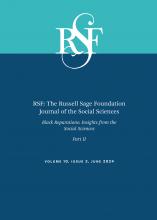Abstract
Successful Black reparations require a policy for delivering payments, one that provides for effective identification, disbursement, asset protection, and asset growth over time. In this article, we suggest a structural solution (structured wealth accumulation of reparations payments) to a structural challenge (deeply embedded racial wealth inequality). Analyzing evidence from a longitudinal experiment, we find that Child Development Accounts (CDAs)—a carefully designed and tested asset-building policy for children—provide a model that can inform effective delivery and sustainable growth of reparations. CDA policy models a system of potentially lifelong, centralized asset building, with automatic enrollment, sensible investment options, structured asset protections, low fees, asset growth, and investment targets to achieve individual and family goals. Policy and research implications for Black reparations and reduction in racial wealth inequality are discussed.
- Black reparations
- policy delivery
- racial wealth inequality
- Child Development Accounts
- lifelong asset building
- © 2024 Russell Sage Foundation. Shanks, Trina R., Jin Huang, William Elliott III, Haotian Zheng, Margaret M. Clancy, and Michael Sherraden. 2024. “A Policy Platform to Deliver Black Reparations: Building on Evidence from Child Development Accounts.” RSF: The Russell Sage Foundation Journal of the Social Sciences 10(3): 92–111. https://doi.org/10.7758/RSF.2024.10.3.05. Current support for the SEED for Oklahoma Kids Experiment (SEED OK) and using evidence to inform policy comes from the Ford Foundation, the Charles Stewart Mott Foundation, and an anonymous donor. The authors are grateful for our partnerships with the State of Oklahoma through Todd Russ, state treasurer; Randy McDaniel, Ken Miller, and Scott Meacham, former state treasurers. This work would not have been possible without the steadfast partnership over more than fifteen years with Tim Allen, deputy treasurer for communications and program administration in Oklahoma. During the implementation of SEED OK, we were grateful to James Wilbanks, former director of revenue and fiscal policy. The Oklahoma College Savings Plan Program Manager, TIAA Tuition Financing, also has been a valuable partner. We appreciate the contributions of staff at RTI International. At CSD, we are grateful to SEED OK research team members Yunju Nam, Youngmi Kim, Nora Wikoff, and SEED OK research staff from years past, including Bob Zager, Krista Taake Czajkowski, Lisa Reyes Mason, and others. The authors thank Chris Leiker and John Gabbert for editorial assistance and graphic design. Direct correspondence to: Trina R. Shanks, at trwilli{at}umich.edu, Harold R. Johnson Collegiate Professor of Social Work, School of Social Work, University of Michigan, 1080 S. University, Ann Arbor, MI 48109, United States; Jin Huang, at jin.huang{at}slu.edu, School of Social Work, Saint Louis University, 3550 Lindell Blvd., St. Louis, MO 63103, United States; William Elliott III, at willelli{at}umich.edu, 1080 S. University, Ann Arbor, MI 48109, United States; Haotian Zheng, at haotian.z{at}wustl.edu, Washington University, MSC 1196–251–46, One Brookings Dr., St. Louis, MO 63130, United States; Margaret M. Clancy, at mclancy{at}wustl.edu, Washington University, MSC 1196–251–46, One Brookings Dr., St. Louis, MO 63130, United States; Michael Sherraden, at sherrad{at}wustl.edu, Washington University, MSC 1196–251–46, One Brookings Dr., St. Louis, MO 63130, United States.
Open Access Policy: RSF: The Russell Sage Foundation Journal of the Social Sciences is an open access journal. This article is published under a Creative Commons Attribution-NonCommercial-NoDerivs 3.0 Unported License.






